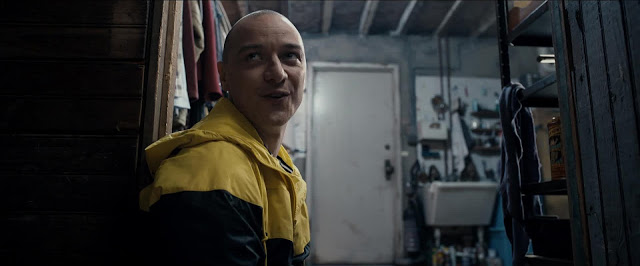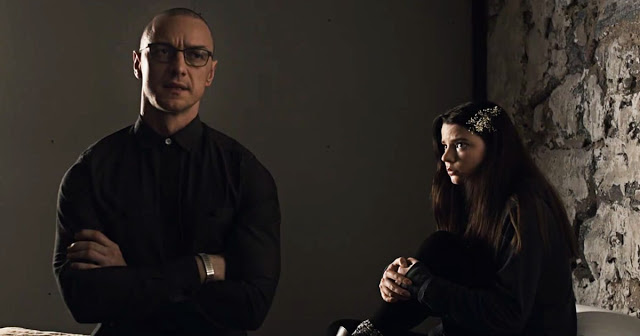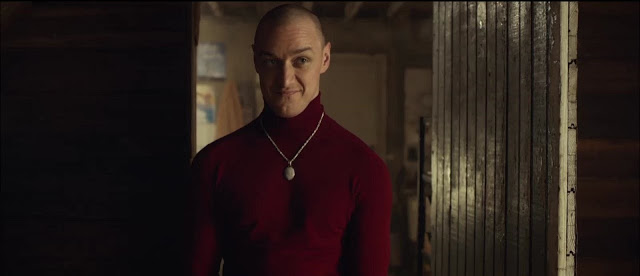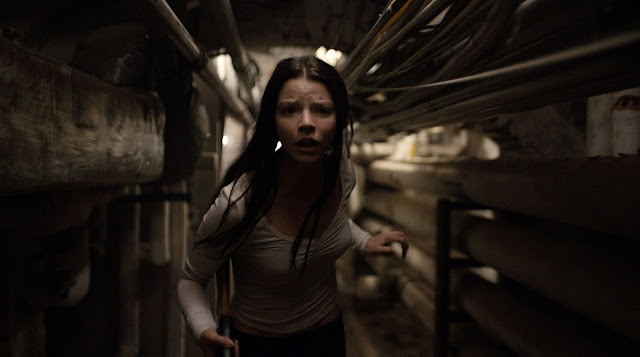To call Split a comeback for M. Night Shyamalan is both accurate and somewhat troubling. The cinematic Icarus of the early twenty-first century, Shyamalan’s rapid ascent and subsequent plunge was difficult to watch. But his transgressions were sins of commission rather than omission—even when he was failing, he was always trying. Yet his most recent film, the found-footage flick The Visit, heralded a director who had diluted his ambition with pinches of modesty and self-awareness. That trend continues with Split, a lean and spiky movie that feels as though it could have arrived in the ’90s, before its creator let those “the next Spielberg” claims go to his head. This raises the question: Should we really be applauding filmmakers for abandoning their fearless attempts at the new and instead returning to the cozy confines of the familiar?
If it results in movies as taut and entertaining as this one, then yes. Split may be a pure, unvarnished genre exercise, but it’s a damn good one, a superlative example of twitchy suspense and tightly controlled craft. During his period of failure—which, in this critic’s view, spans from Lady in the Water to After Earth but definitely does NOT include The Village—Shyamalan tried all sorts of new things; they didn’t work. Split does many things—it frightens, delights, stumbles, and amazes—but most simply, it works.
The ravishing, nail-biting opening sequence of Split is a perfect distillation of its director’s gifts. Three teenage girls pile into a sedan, two of them gabbing in the back while the third, Casey (Anya Taylor-Joy, excellent)—instantly identifiable by her rumpled wardrobe and slouched demeanor as a misfit—perches tentatively in the passenger seat. After Casey spies some debris in the side mirror, her features grow even warier, and when we hear (but do not see) the driver-side door open, she slowly turns her head, staring into the camera with abject fear. Only then does Shyamalan tilt away from Casey and reveal the car’s newest occupant: an intruder, who spots some crumpled wrappers, sighs wearily, and sprays Casey’s companions with a gas that renders them unconscious. Paralyzed with terror, Casey slowly reaches to open her door, and you think that maybe this mysterious man will actually let her escape, and then beep—the car signals that a door is ajar, and the man sends Casey to join her comatose classmates. Roll opening credits.
This is a killer cold open, and it demonstrates Shyamalan’s knack for patience and withholding. Any director can startle his audience via jump scares, but Shyamalan prefers a more sustained and unsettling approach. His persistent close-ups do more than just allow his actors to express their emotions— they shrink the frame, limiting your perception and thereby preying on your imagination. Later, when a captive hides inside a locker, he shifts to her restricted point of view, forcing you to tremble with her uncertainty and to wait alongside her in agony.
Casey and her two fellow victims—they are Marcia (Jessica Sula) and Claire (Haley Lu Richardson, from The Edge of Seventeen)—do a good deal of waiting in Split, which finds them after their assault waking up in a small, spartan room with two beds and a double-bolted door. There they again meet their captor, Dennis, a germophobe who has a predilection for watching girls dance but who, thanks to some ingeniously foul quick-thinking from Casey, promises the young women that they will not be harmed for the next several days. They also meet Patricia, a genteel woman who assures them that Dennis will not touch them and that they should attempt to remain comfortable until “he” arrives. And then there is Hedwig, a chatty nine-year-old boy who babbles about his socks and regards Dennis and Patricia with a combination of admiration and apprehension.
The hook of Split, of course, is that Dennis, Patricia, and Hedwig are all actually the same person, which means they are all played by the same actor, James McAvoy. His character, whose name at birth was Kevin, suffers from dissociative identity disorder, meaning his mind has splintered into twenty-three distinct personalities. When Split isn’t spending time with Casey and chronicling her frantic efforts to escape, it follows this fractured figure as he wanders through Philadelphia, usually under the guise of an amiable fellow named Barry who has regular sessions with a therapist, Dr. Fletcher (Betty Buckley, of “Why you eyein’ my lemon drink?” infamy). These appointments, which involve a good deal of explanatory babble and pseudo-scientific mumbo-jumbo—Dr. Fletcher theorizes that those afflicted with Kevin’s illness can actually change their physiology as well as their personality—represent Split at its weakest. Relying too heavily on backstory and exposition, they puncture its mystery and inflate its kitsch.
But while Split is ostensibly a premise-driven movie, it is really a showcase for its two lead actors, both of whom perform beautifully. McAvoy, who in other recent monosyllabic titles such as Trance and Filth has attempted to add an element of edge to his smoothly sanded persona, is plainly having the time of his life, trotting out an array of hammy accents and emphasizing each of his identities’ peculiar traits. If his disparate personalities don’t entirely seem to belong to the same person, that’s arguably the point, and McAvoy takes relish in his persistent accentuation. The real key to the film, however, is Taylor-Joy. So marvelous in last year’s The Witch, she proves the perfect counterpoint, answering McAvoy’s flamboyance with impeccable reserve; remarkably expressive, she internalizes her performance, visibly communicating her mounting fear and racing brain without resorting to histrionics. Taylor-Joy turns Casey into a real character rather than a helpless Final Girl, and the movie’s repeated, seemingly digressive flashbacks to her childhood—featuring House of Cards’ Sebastian Arcelus as her father and Orange Is the New Black’s Brad William Henke as her uncle—generate a manipulative but surprisingly potent payoff.
And if Split has no intention of being taken seriously, it is nevertheless the work of a serious filmmaker. Back in his element, Shyamalan imbues the movie with a pervasive chilliness that feels stylish but never grandiose. He’s still a virtuoso showman with the camera, and some of his images—a POV shot of a person lying on her side, the camera turned 90 degrees; a knife blade breaking in two; a girl stirring from sleep and gradually realizing that someone’s arm is slung over her shoulder; another POV of a child hiding under a bed, glimpsing only his adversary’s feet—invest Split with real visual panache. He also flaunts some classic Hitchcockian flair, placing critical information in the background of the frame and waiting patiently for characters to notice it.
As it must, Split goes bonkers in its final act, the simmering tension boiling over into frenetic chases and garish violence. (Much like The Conjuring 2, the climax here features a dash of Rumpelstiltskin, though this one is less of a cheat.) Even here, however, Shyamalan exhibits poise and polish, staging his mayhem with vigor without relinquishing his rigor. And while Split’s post-credits stinger coyly teases an upcoming sequel that will surely set certain cultists abuzz, Shyamalan avoids his usual reliance on a gimmicky third-act twist. It makes sense—there’s no need to hinge this movie’s success on a cheap rug-pull when it’s already so sinewy and effortlessly watchable. Split may be about a man with multiple personalities, but it’s clearly the work of a filmmaker who, following a decade’s worth of poorly conceived, ill-fitting misfires, has finally reclaimed his identity.
Jeremy Beck is the editor-in-chief of MovieManifesto. He watches more movies and television than he probably should.





First, Jess agrees with your portrayal of the leading lady, Joy-Taylor. She loved her doe-like eyes.
Second, as a former public defender, I have some experience with DID clients. While I'm not sure about the physical transformation part, the inability of people to track their different personalities is incredible. A lot of people think it's a joke or charade, but that's not true in my experience. It's a complete and repeated loss of the ability to control their actions due to alter-egos, and just because they have some semblance of remembering the other personalities, that does not translate into knowing control and understanding of what's going on. The internal struggle and constant battling is incredible to witness, but also raises very tricky questions of competency, culpability, etcetera.
Thanks for recognizing McAvoy's performance. I thought he was the best part. If I were to watch one movie of his – which would it be?